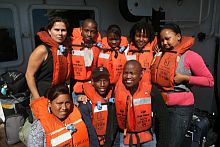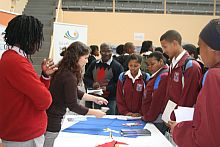Internship, research ship, studentship - from internship to PhD
|
The Human Capital and Knowledge Systems programme run by the Department of Science and Technology (DST) in association with the National Research Foundation (NRF), created an internship programme where graduates are given the opportunity to work for institutions and gain valuable work experience.
The institutions range throughout the field of science and include space science, food science and immunology, to name a few. Interns are placed at varying institutions according to their field of study and are exposed to research through their mentors.
As an intern based at SAEON’s Egagasini Node, I was fortunate to be exposed to a wide range of opportunities to learn and experience the marine science working environment. I gained knowledge and experience in areas ranging from methodologies, science writing skills, networking skills and presentation skills to office management, project management and education outreach activities.
SAEON Egagasini gave me the opportunity to be part of an international research effort in the Indian Ocean through the Agulhas Somali Current Large Marine Ecosystem (ASCLME). A part of the programme included sampling, for the first time, of in-situ physical and biological variables in the Comoros basin aboard the research vessel RV Dr Fridtjof Nansen. This was an invaluable experience for me as I did not have much previous experience in biological in-situ sampling.
In addition, with the support of Dr Isabelle Ansorge, my supervisor at the University of Cape Town (UCT), I was able to present a poster on my Masters research at an international conference. This presented a great opportunity to learn from scientists about their current research and to be exposed to possible future research areas.
Over and above the practical and scientific experience that I’ve gained, I’ve also developed self-confidence and people skills. I’ve been exposed to a very diverse range of experiences and I have my host institution manager, Dr Juliet Hermes, the DST, NRF and SAEON to thank for this.
Fisheries management and decision-support tools
While completing coursework during my Masters degree, I was exposed to a wider range of topics in the marine science field and developed a strong interest in fisheries management and decision-support tools. I will be joining UCT in April to further my studies in marine science. Based in the Zoology Department, I will be conducting an inter-disciplinary study on a coastal community in South Africa.
An ecosystem approach to fisheries management (EAF) is a holistic approach that seeks to balance the three dimensions of human well-being, ecological well-being and ability to achieve. It essentially endeavours to manage fisheries in a sustainable way.
My research at UCT aims to address the challenges of governance and management of EAF through a mediated modelling exercise. The focus is to create a conceptual model and then a dynamic systems model through a mediated process with stakeholders, which will be able to assist in the management of the coastal town’s fisheries and environment. The model will be able to look at different scenarios and assist in decision making and planning for sustainability. A further and important outcome from the mediated process is that of consensus building and a deeper understanding of the pertinent issues at hand.
My experiences at SAEON have been very positive. I look forward to the possibility of contributing to SAEON in the future through educational activities and by creating new knowledge in the field of marine science and resource management.












